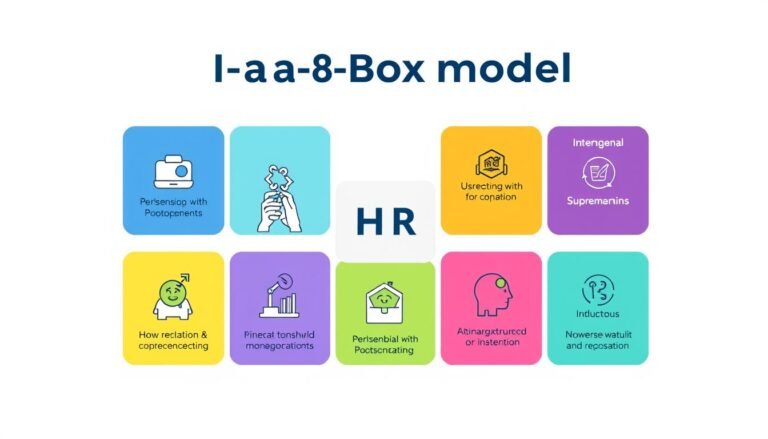Ethical Leadership in HR
In today’s business world, ethical HR practices are more vital than ever. Responsible leadership sets the tone for an organization’s culture and values. The concept of values-driven management is gaining traction as companies recognize its impact on success.
Ethical leadership in HR goes beyond just following rules. It’s about creating a workplace where people feel valued and respected. Leaders who prioritize ethics often see higher employee satisfaction and better retention rates.
Organizations known for their ethical practices tend to attract top talent and loyal customers. This approach to leadership involves making tough decisions that balance the needs of employees, the company, and stakeholders.
HR leaders play a crucial role in shaping company policies. They ensure these policies comply with labor laws and promote fairness. Training programs on ethical behavior and organizational values help employees understand their responsibilities.
Key Takeaways
- Ethical HR practices boost employee satisfaction and retention
- Values-driven management attracts top talent and customers
- Responsible leadership balances employee, company, and stakeholder needs
- Clear, compliant policies are essential for ethical HR leadership
- Training on ethics and values helps employees understand their role
Understanding Ethical Leadership in Human Resources
Ethical leadership in HR sets the moral tone for a company. It involves making tough choices that stick to the company’s values. This approach helps build trust, boosts morale, and makes the workplace better.
Definition of Ethical Leadership
Ethical leadership is about showing and teaching the right way to act. It means leading by example and setting high standards for integrity. Ethical leaders treat everyone fairly, communicate openly, and solve conflicts justly.
Importance in the Workplace
Ethical leadership is key for lasting success. It stops scandals, solves tough problems, and builds trust. Companies with ethical leaders see happier employees and better performance. They also attract the best talent and keep customers coming back.
| Impact of Ethical Leadership | Percentage |
|---|---|
| Increase in employee trust | 75% |
| Reduction in ethical misconduct | 40% |
| Boost in employee morale | 55% |
Ethical leadership has a big impact. It improves the company’s image, makes hiring easier, and attracts investors. By focusing on employee well-being, ethical leaders build strong teams ready for any challenge.
Key Principles of Ethical Leadership
Ethical leadership is key to a successful company. With Generation Z joining the workforce, it’s more important than ever. Let’s look at the main ideas that guide ethical choices in HR.
Integrity and Transparency
Integrity is the foundation of ethical leadership. Leaders who are honest build trust. This trust is crucial, as shown by JetBlue’s actions.
JetBlue canceled over 1,000 flights, but the CEO’s honesty kept customers loyal.
Transparency is just as important as integrity. When leaders share openly, even in tough times, it builds accountability. This openness helps avoid scandals and keeps a company’s reputation strong.
Fairness and Justice
Fair treatment is a core part of ethical leadership. It ensures everyone has an equal chance, promoting equality and respect. This leads to happier employees and better retention, with 95% of HR experts agreeing.
Justice in decision-making is also key. When leaders make ethical choices, even when it’s hard, they set a great example. This commitment to fairness boosts productivity by 62% and cuts turnover by 45% in HR.
“Ethical leadership is not about being perfect, but about consistently striving to do what’s right, even when it’s challenging.”
By following these principles, leaders can build a workplace that’s not just legal but also trustworthy and successful in the long run.
The Role of HR in Promoting Ethics
HR is key in making sure companies act ethically. They set rules and train staff to build a fair work culture.
Developing Ethical Guidelines
HR makes and follows rules that match labor laws. These rules cover things like:
- Fair hiring to avoid unfair treatment of certain groups
- Rules against favoritism and trading favors
- How to deal with conflicts of interest
- Keeping employee secrets safe
- Ensuring a safe and healthy work environment
Training and Development Programs
Organizations need to train staff on ethics. These programs teach:
- Legal rules and how to follow them
- How to make ethical choices
- Creating a safe and open workplace
- Building trust and honesty
- Dealing with tough ethical choices
By focusing on ethics, companies build trust and respect. This not only lowers legal risks but also makes the company more attractive to good employees.
| Benefits of Ethical HR Practices | Impact on Organization |
|---|---|
| Increased employee trust | Improved team success and productivity |
| Enhanced company reputation | Attraction and retention of top talent |
| Reduced legal and reputational risks | Long-term sustainability and success |
| Positive workplace culture | Higher employee engagement and satisfaction |
With ethical HR and leadership, companies can make a place where everyone feels valued and respected. This lets employees do their best work.
Impact of Ethical Leadership on Company Culture
Ethical leadership is key in shaping a company’s culture. It sets a tone of integrity and respect. This creates a positive work environment where everyone values and practices ethics.
Fostering Trust Among Employees
Transparency, fairness, and accountability are vital in ethical leadership. They build trust in an organization. A study in Frontiers in Psychology shows a strong link between job satisfaction and ethical leadership.
Enhancing Employee Engagement
Ethical leadership greatly increases employee engagement. Companies with ethical leaders see a 20% rise in engagement. This leads to better performance, with a 25% performance boost.
| Impact Area | Percentage Increase |
|---|---|
| Employee Morale | 66% |
| Employee Engagement | 50% |
| Performance Boost | 25% |
Ethical leadership also improves how the company is seen outside. A 2022 Google Cloud poll shows 66% of shoppers look for eco-friendly brands. This shows how important values-driven management is in attracting customers and investors.
“Ethical leadership is the foundation of a thriving company culture, fostering trust, engagement, and overall business success.”
Ethical Decision-Making in HR Practices
Ethical decision making is key in HR practices. It builds integrity in the workplace. HR professionals help shape the company’s ethics and guide employees through tough moral choices.
Frameworks for Ethical Decisions
HR uses structured frameworks to tackle ethical issues. These frameworks think about the effects on everyone involved and match the company’s values. The Society for Human Resource Management (SHRM) stresses the need for Ethical Practice in HR.
- Over 60% of organizations have codes of ethics or conduct
- 53% of businesses offer mandatory ethics training
- 75% of employees see their companies as ethical
Case Studies of Ethical Dilemmas
Real-life examples show the tough choices HR faces. For example, a company might have to cut budgets, affecting employee well-being and financial health. Another issue could be handling workplace harassment while keeping it private.
| Ethical Challenge | Potential Solution |
|---|---|
| Conflict of Interest | Implement clear disclosure policies |
| Discrimination Claims | Conduct thorough, unbiased investigations |
| Data Privacy | Establish strict data protection protocols |
By making ethical decision-making part of performance reviews and goals, companies can build integrity. This approach boosts employee trust and helps the business grow over time.
Assessing Ethical Leadership Competencies
Ethical leadership is key in today’s business world. HR professionals help create a values-driven culture in companies. Let’s look at the important skills for ethical leaders and how to measure them.
Essential Skills for Ethical Leaders
Ethical leaders have unique skills that make them stand out. These include:
- Setting a positive example
- Treating everyone with equal respect
- Maintaining open communication
- Fair mediation of conflicts
- Effective stress management
- Adaptability to change
- Zero tolerance for ethical violations
Tools for Assessment
HR uses different tools to check on ethical leadership:
- Surveys: Check what employees think about leadership ethics
- Performance evaluations: Look at ethical decision-making
- 360-degree feedback: Get a full view of a leader’s ethics
- Scenario-based assessments: See how leaders handle ethical problems
- Psychological assessments: Understand a leader’s ethical thinking
Interestingly, 94% of HR people see the need for ethical leadership in tough times. But only 63% say they act morally. This shows the need for ongoing training to improve ethical decision-making and build integrity in companies.
Building an Ethical Workplace Environment
Creating a workplace that values ethical HR practices and prioritizes employee well-being is crucial for modern organizations. A strong ethical foundation fosters trust, boosts morale, and enhances overall productivity.
Strategies for Encouraging Open Communication
Open communication is key to building an ethical workplace. Companies can implement regular feedback sessions, town hall meetings, and suggestion boxes to encourage dialogue. A study shows that employees who receive meaningful feedback are four times more likely to be engaged. This approach not only improves employee satisfaction but also helps identify potential ethical issues early on.
Creating a Safe Reporting System
A safe reporting system is essential for addressing ethical concerns. Organizations should establish anonymous hotlines and online platforms for reporting misconduct. This practice increases the likelihood of employees speaking up about unethical behavior. In fact, employees are 24% more likely to report issues if they trust leadership.
To further illustrate the importance of ethical practices, consider these statistics:
- 41% of U.S. workers reported observing unethical conduct on the job in 2013
- Companies with strong ethical cultures saw only 20% of workers witnessing misconduct
- 81% of companies now provide ethics training, up from 74% in 2011
By implementing these strategies and focusing on ethical HR practices, organizations can create a workplace environment that promotes integrity, transparency, and employee well-being.
| Ethical Practice | Impact on Workplace |
|---|---|
| Regular Feedback | 4x increase in employee engagement |
| Strong Ethical Culture | 68% reduction in observed misconduct |
| Ethics Training | 7% increase in company adoption |
Challenges in Ethical Leadership
Ethical leadership is tough in today’s business world. As companies grow, they might forget about ethics for profit. Leaders must keep ethics first.
Navigating Conflicts of Interest
Leaders often face tough choices between ethics and money. For example, cutting costs by ignoring safety rules can lead to lawsuits. The 1982 Tylenol poisonings show the need for quick action in ethics crises.
Johnson & Johnson removed 31 million bottles to protect trust. This cost over $100 million but saved public trust.
Dealing with Unethical Behavior
Handling unethical behavior needs clear rules and openness. Employees should feel safe to report issues. The 2018 Starbucks incident, where two Black men were wrongly arrested, sparked protests.
Starbucks closed 8,000 stores for racial bias training. This affected 175,000 employees and cost $12 million in lost profit.
| Company | Ethical Challenge | Response | Impact |
|---|---|---|---|
| Johnson & Johnson | Tylenol poisonings | Product recall | $100 million cost |
| Starbucks | Racial bias incident | Bias training | $12 million lost profit |
| Southwest Airlines | Flight cancellations | System upgrades | 16,700 flights canceled |
These cases highlight the role of ethical leadership. It’s crucial for facing corporate challenges and keeping trust. Leaders must always stand by ethics, even when it’s hard.
The Connection Between Ethics and Compliance
Ethics and compliance are key to good HR practices. Today, knowing the law is important. But ethical leadership is more than just following rules. It’s about caring for the community and all stakeholders.
Understanding Legal Requirements
HR compliance means following laws and rules. There are over 150,000 jobs in this field worldwide. HR teams make sure companies act fairly and safely.
Defining Corporate Social Responsibility
Corporate social responsibility (CSR) is linked to ethical HR. It’s about doing good beyond making money. Companies that care about CSR often do better financially.
HR leaders create codes of conduct and lead by example. They also make sure there are safe ways to report problems. This builds a culture of honesty and respect for everyone involved.
“Ethical leadership is not just about following rules. It’s about creating a workplace where people feel valued, heard, and inspired to do their best work.”
The link between ethics and compliance in HR is clear. Compliance keeps things legal, while ethics makes the workplace better. Together, they help businesses succeed and be responsible today.
Measuring the Success of Ethical Leadership
It’s key for companies to check how well their leaders act ethically. A study in Macau’s service sector showed a strong link between ethical leadership, happy employees, and clear company policies.
Key Performance Indicators
Good ethical choices boost both employee happiness and company success. Here are some important numbers:
- 56% increase in job performance with high organizational belonging
- 50% reduction in turnover risk
- 75% decrease in sick days
- 30% gains in service, performance, and profits
Employee Feedback and Surveys
It’s important to ask employees how they feel about the company’s ethics. Experts say to do this twice a year. The study showed that ethical leadership makes employees happier, more engaged, and see the company as more open.
| Ethical Leadership Impact | Percentage |
|---|---|
| Improved Brand Image | 85% |
| Better Employee Retention | 70% |
| Higher Productivity | 65% |
| Increased Employee Loyalty | 80% |
To promote ethical leadership, companies can start programs like Harvard DCE’s Ethical Leadership course. These programs teach leaders how to make ethical choices and build a culture that values people.
Future Trends in Ethical Leadership in HR
The world of ethical leadership in HR is changing fast. Two big trends are leading the way: technology and diversity and inclusion. These changes are making HR practices better and changing how leaders work.
The Role of Technology
Technology is changing how we lead in HR. AI tools are key for staying competitive. A big 79% of leaders say AI is vital for success.
But, 60% of companies don’t know how to use AI well. This creates both challenges and chances for HR to lead in using AI ethically.
Emphasis on Diversity and Inclusion
Diversity and inclusion are now key in ethical leadership. Companies like Unilever are leading the way. Their CEO wants to cut down environmental harm and stop deforestation.
This effort matches what 87% of US workers want. They want to work for companies that care about the planet and ethics.
As we look to the future, HR leaders must mix technology with ethics. They need to make sure employees can report issues safely and talk openly. This builds trust, improves morale, and boosts productivity.
The future of ethical leadership in HR is about embracing these trends while keeping our values strong.
Source Links
- The Importance of Ethical Leadership in HR
- What is Ethical Leadership? Attributes, Traits, & Examples
- The Role of Ethical Leadership in Modern HR
- What Is Ethical Leadership?
- How HR Can Support Ethical Leadership
- Ethical Leadership in HR: Navigating Moral Dilemmas and Upholding Integrity
- What is Ethical Leadership and Why is it Important? – Professional & Executive Development | Harvard DCE
- 12 Characteristics of an Ethical Leader to Adopt Today – Ethico
- HR Ethics: HR’s Role in Creating an Ethical Workplace
- Code of Ethics
- Council Post: Why Ethical And Transparent HR Decision-Making Is Crucial To Team Success
- Why Ethical Leadership is Important for Business Success – Ethico
- The Impact of Ethical Leadership on Organizational Culture and Performance
- Ethical Decision-Making and the HR Profession
- The role of ethical decision making in human resources
- Ethical Leadership: Assessing Ethical Values InThe Hiring Process – rightadvisors.com
- Ethical Leadership for Human Resource Professionals
- How to Create a Culture of Ethics & Accountability in the Workplace
- Creating an Ethical Workplace
- Building a Culture of Ethical Leadership | Infinite Strengths – Infinite Strengths
- Challenges of Ethical Leadership
- 4 Examples of Ethical Leadership in Business | HBS Online
- What Is the HR Leader’s Role in Compliance and Ethics?
- Ethical leadership: Fostering a culture of integrity from the top down
- Ethical Leadership: Examining the Relationships with Full Range Leadership Model, Employee Outcomes, and Organizational Culture – Journal of Business Ethics
- The Relationship Between Ethical Leadership and Employee Job Satisfaction: The Mediating Role of Media Richness and Perceived Organizational Transparency
- What Is Ethical Leadership And Why It’s Important In The Workplace? – Fuel50
- How ethical leaders scale respect across their organization – SmartBrief
- 11 HR Trends for 2025: Embracing Disruption
- Ethical Leadership in HR: Key Traits and Practices | HR Shelf
- Ethical Leadership in HR – Navigating Complex People Issues With Integrity








